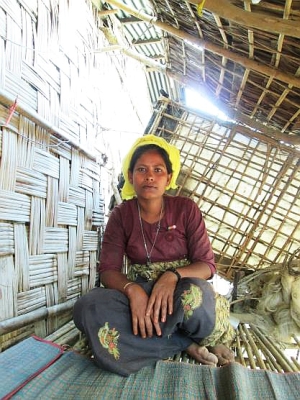Following the outburst of violence that occurred in Rakhine State in 2012, around 140,000 were displaced. Among them, many women and children such as Amira who fled her home with her husband and their children. Today, she lives in the Koe Tan Kauk (KTK) Camp, Rathedaung township, where SOLIDARITÉS INTERNATIONAL tries to smoothen the hard living conditions.
Living in a camp as a woman
 “We were forced to leave our village. We went to the other side of the Mayu Mountain to flee the attacks,” Amira begins. This is a dangerous trip, but displaced people have to make this choice if they want to flee the conflict. “Now, my family and I are living in a shelter which we share with eight other households,” she explains. The camp gathers several communities from different villages and it is not always easy for them to live together.
“We were forced to leave our village. We went to the other side of the Mayu Mountain to flee the attacks,” Amira begins. This is a dangerous trip, but displaced people have to make this choice if they want to flee the conflict. “Now, my family and I are living in a shelter which we share with eight other households,” she explains. The camp gathers several communities from different villages and it is not always easy for them to live together.
Traditionally, women are in charge of fetching water in Amira’s community. “Before SOLIDARITÉS INTERNATIONAL’s intervention, my elder daughter and I had to go far from the camp to fetch water. It was very insecure for two women. Now, we go two times a day to the water tank a few metres away from our shelter. I feel more secure today to use infrastructures inside the camp”. Thanks to this intervention, women can fetch more water, in a less tiring way, and more safely. This is a real improvement of the living conditions.
Improving living conditions is a priority
The displaced populations faced the same concerns with hygiene. Before, people had to go to the bush to defecate. “Now, we have four washrooms per shelter and the camp has latrines. When we arrived, there was nothing,” Amira adds. SOLIDARITÉS INTERNATIONAL also focuses on effective actions such as hygiene promotion to improve IDP’s hygiene practices.
“However, despite the improvement of living conditions enabled by the actions of our teams, life in this area remains difficult for most of us. We want to go back to our places of origin”. As farmers, displaced people used to work in their own fields. Since 2012, they have lost access to their land, and to their income. Being in a camp is not helping. “We have to face movement restrictions and resentment of the surrounding communities. It is hard for us to find jobs or lands to use,” she tells.
Helping people to cope with the crisis
For the IDPs living in a camp or in host communities, SOLIDARITÉS INTERNATIONAL will now implement more food security and agricultural livelihood projects to enhance the links between these different communities and to permit them to recover an activity.
The long-term goal of SOLIDARITÉS INTERNATIONAL is to continue to monitor and support communities as they take full responsibility for the infrastructures. In the IDP camps, SOLIDARITÉS INTERNATIONAL will reduce its water, sanitation and hygiene (WASH) activities in order to begin to progressively handover to WASH committees and community leaders, enhancing the empowerment of the communities.
Support displaced women like Amina
Myanmar
Context and action- 54.4 million inhabitants
- 149th out of 191 countries on the Human Development Index
- 178.000 people helped
